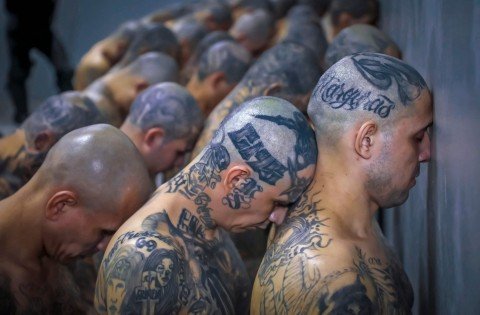At least 153 prisoners in El Salvador have been tortured and killed since the country jailed tens of thousands in a crackdown on street gangs earlier this year.
A report from human rights group Cristosal lays bare the human cost of the country’s ‘war on gangs,’ which has seen dozens of people die in state custody after being imprisoned without trial.
Four women were among those killed and the vast majority of the deaths were the result of torture, and systematic and serious injuries, the report said.

Nearly half of the victims suffered violent deaths, with their bodies showing signs of asphyxiation, fractures and lacerations. Metro reports.
Others showed signs of malnutrition and deliberate denial of food, medicine and medical assistance.
None of the people who died in prison had not been officially convicted of the crime they were accused of committing at the time of their arrest.
The deaths revealed punitive policies carried out by guards and prison officials.
The report stated that such actions would have required authorization and backing by the highest level security officials.
El Salvador opened a mega-prison earlier this year to house some 40,000 suspected gang members, after the government granted itself emergency powers in March 2022 to tackle the country’s powerful street gangs.
The high-tech prison, designed specifically to house gang members, is the largest of its kind in the Americas, and the security minister for the Central American country warned inmates they ‘will never walk out of here’.

Following its opening, El Savador’s president Nayib Bukele tweeted that ‘at dawn, in a single operation, we transferred the first 2,000 members to the Center for the Confinement of Terrorism (CECOT)’.
He added: ‘This will be their new house, where they will live for decades, all mixed, unable to do any further harm to the population.’
The rights group’s report comes as a judge sentenced former El Salvador President Mauricio Funes to 14 years in prison on Monday for allegedly negotiating with gangs during his administration.
Funes’ trial began in April with the former leader living in Nicaragua.
El Salvador changed its laws last year to allow trials in absentia.
Prosecutors had accused Funes of illicit association and failure to perform his duties for the gang truce negotiated in 2012. Funes had denied negotiating with the gangs or giving their leaders any privileges.
Funes’ former Security Minister Gen. David Munguía Payes was also sentenced to 18 years in prison for his involvement in the negotiations.
The former president, who governed from 2009 to 2014 and lives in Nicaragua, was granted Nicaraguan citizenship in 2019.
The Nicaraguan constitution holds that no citizen may be extradited.












